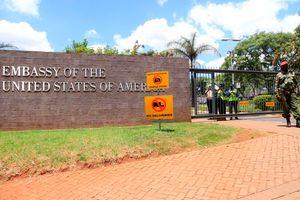
From left: Kipchumba Murkomen, Hassan Joho and Aden Duale.
Kipchumba Murkomen, Hassan Joho, and Aden Duale received the highest memorandums from Kenyans opposed to their nomination, a parliament survey has revealed.
Mr Murkomen has been nominated to the Youth Affairs, Creative Economy and Sports docket, Mr Joho to Mining and Blue Economy, while Mr Duale has been nominated to serve as CS for Environment, Climate Change, and Forestry.
According to an analysis done by Parliament and seen by Nation, Mr Murkomen received 92 petitions, Joho 72, and Duale 69 memorandums.
According to the document, Interior CS nominee Kithure Kindiki received 68 petitions, while David Chirchir, who has been nominated as Roads CS, received 58 petitions challenging their nominations.
Defence Cabinet Secretary nominee Soipan Tuya received 48 petitions, while her Lands, Public Works, Housing and Urban Development Cabinet Secretary counterpart Alice Wahome had 40 petitions filed against her nomination.
Wycliffe Oparanya had 33 petitions filed against his nomination, John Mbadi who is the Treasury nominee had 31, Alfred Mutua (Labour and social protection) received 23, and Education CS nominee Julius Ogamba had 21, while Salim Mvurya (Trade and Investments) and Rebecca Miano (Tourism and Wildlife) all received 19 petitions challenging their nomination.
Opiyo Wandayi, who has been nominated to serve as Energy and Petroleum CS, received 11 petitions questioning his nomination, Justin Muturi (Public Service) received 16 petitions, and Health CS nominee Debra Mlongo had six petitions challenging her nomination.
Both Margaret Nyambura Ndung’u, who has been nominated as CS for Information, Communication, and Technology) and Andrew Mwhia Karanja (Agriculture and Livestock) received only one petition challenging their nominations.
Parliament received a total of 1,368 memorandums in total. However, a total of 157 memorandums that were sent through emails were found to have not complied with section 6 (9) of the Parliamentary Approvals Act.
Section 6 (9) of the Public Appointments (Parliamentary Approval) Act, 2021 provides that “any person may before the approval hearings and by written statement on oath, provide the clerk with evidence contesting the suitability of a candidate to hold the office to which the candidate has been nominated.
Article 118 of the constitution provides that Parliament shall facilitate public participation and involvement in the legislative business and other business of Parliament and its committees.
Section 6 (4) of the Act further provides that the Clerk shall notify the public of the time and place of holding approval hearings at least seven days before the hearings.
In the analysis, 32 memorandums were found to have no relation with the subject matter as some members of the public were requesting jobs instead of submitting their concerns to the nominees.
A further 17 memorandums received by parliament were found to be inadmissible since they were unsigned and not commissioned by law.
While some of the memorandums opposed the nomination of the CSs, others were just general comments regarding the nominees while others supported the nominees giving reasons why they were qualified.
Upon receipt of the memorandums, they were sent to the nominees who have responded to them through writing which will be considered by the committee when it retreats and will form part of the committee report.
Speaker of the National Assembly Moses Wetang’ula promised members of the public that the committee on appointments would scrutinize all the memorandums.
He said that even those memorandums that were not accompanied by affidavits as required by law, the committee will not discard them but will ensure the concerns raised in them are addressed by the nominees.
“Where the concerns shall as far as practicable include the concerns raised in the submissions in the questions that it will pose to nominees,” Mr Wetang’ula said.
The committee will conclude the vetting on Sunday before retreating to write its report which is expected to be tabled on Tuesday next week.
The House is scheduled to debate the report for two days before approving it or rejecting it.







